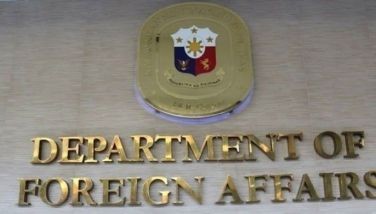GMA scraps Estrada’s economic superbody

January 27, 2001 | 12:00am
The Economic Coordinating Council (ECC) is now history.
President Arroyo announced Thursday night that she has decided to abolish the ECC which was formed by her disgraced predecessor Joseph Estrada to coordinate and implement economic policies.
The ECC was created through Executive Order No. 193 in January 2000, allegedly at the instance of Finance Secretary Jose Pardo who had then had just assumed the finance portfolio vice Edgardo Espiritu.
EO 193 also created the Council of Senior Economic Advisers composed of five of the most respected business leaders in the country.
The five council members were former Bangko Sentral Gov. Gabriel Singson, accounting and auditing guru Washington Sycip, former Prime Minister Cesar Virata, former Sen. Vicente Paterno and Jaime Zobel de Ayala.
The ECC was perceived by the local business community and the country’s multilateral creditors as a positive step in stemming the erosion of confidence in the Estrada administration.
Estrada himself chaired the ECC with Pardo as vice chairman.
Others ECC members were the secretaries of trade and industry; budget and management; and agriculture as well the heads of the National Economic Development Authority (NEDA) and the Housing and Urban Development Coordinating Council (HUDCC).
Bangko Sentral ng Pilipinas Gov. Rafael Buenaventura also sat in the council in an ex-officio capacity.
The agency’s creation was among the reasons the International Monetary Fund (IMF) agreed to give the Estrada administration more latitude in a $1.4-billion economic program although its budget deficit was already in the doldrums.
It was also responsible for the unified government response when the stock market almost collapsed in February 2000 due to the price swings in the stocks of Best World Resources Corp.
But the ECC was already slipping in its effort to improve revenue generation, in terms of tax collections and privatization of state assets, and was a dismal failure in encouraging foreign investment in the country.
The credibility of the body was also assailed when Trade Secretary Manuel Roxas II resigned in November last year as demands for Estrada’s impeachment were heating up.
The members of the Council of Senior Economic Advisers subsequently tendered their resignations as calls for Estrada’s resignation widened.
In an obvious attempt to appease the business sector, the disgraced Estrada gave up his ECC chairmanship and offered it to then Social Welfare Secretary Gloria Macapagal-Arroyo, herself an economist, but the latter declined.
President Arroyo announced Thursday night that she has decided to abolish the ECC which was formed by her disgraced predecessor Joseph Estrada to coordinate and implement economic policies.
The ECC was created through Executive Order No. 193 in January 2000, allegedly at the instance of Finance Secretary Jose Pardo who had then had just assumed the finance portfolio vice Edgardo Espiritu.
EO 193 also created the Council of Senior Economic Advisers composed of five of the most respected business leaders in the country.
The five council members were former Bangko Sentral Gov. Gabriel Singson, accounting and auditing guru Washington Sycip, former Prime Minister Cesar Virata, former Sen. Vicente Paterno and Jaime Zobel de Ayala.
The ECC was perceived by the local business community and the country’s multilateral creditors as a positive step in stemming the erosion of confidence in the Estrada administration.
Estrada himself chaired the ECC with Pardo as vice chairman.
Others ECC members were the secretaries of trade and industry; budget and management; and agriculture as well the heads of the National Economic Development Authority (NEDA) and the Housing and Urban Development Coordinating Council (HUDCC).
Bangko Sentral ng Pilipinas Gov. Rafael Buenaventura also sat in the council in an ex-officio capacity.
The agency’s creation was among the reasons the International Monetary Fund (IMF) agreed to give the Estrada administration more latitude in a $1.4-billion economic program although its budget deficit was already in the doldrums.
It was also responsible for the unified government response when the stock market almost collapsed in February 2000 due to the price swings in the stocks of Best World Resources Corp.
But the ECC was already slipping in its effort to improve revenue generation, in terms of tax collections and privatization of state assets, and was a dismal failure in encouraging foreign investment in the country.
The credibility of the body was also assailed when Trade Secretary Manuel Roxas II resigned in November last year as demands for Estrada’s impeachment were heating up.
The members of the Council of Senior Economic Advisers subsequently tendered their resignations as calls for Estrada’s resignation widened.
In an obvious attempt to appease the business sector, the disgraced Estrada gave up his ECC chairmanship and offered it to then Social Welfare Secretary Gloria Macapagal-Arroyo, herself an economist, but the latter declined.
BrandSpace Articles
<
>
- Latest
- Trending
Trending
Latest
Trending
Latest
Recommended































